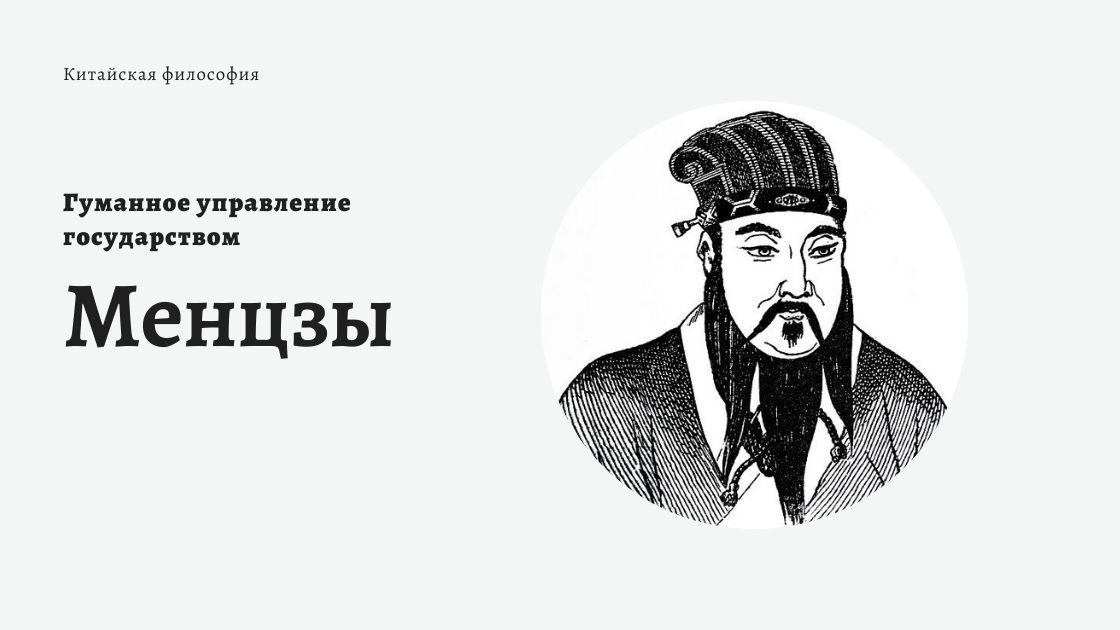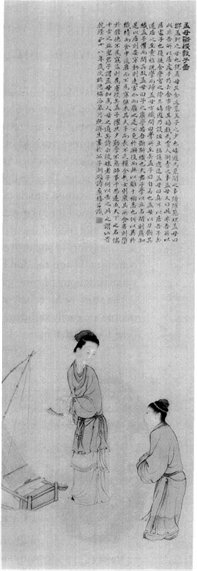Mencius: Humane Governance of the State

Mencius (372-289 BC) was from the province Zhou, in the current county Zhou Shandong Province. His father died when he was very young. It was his mother's teaching that changed his life. Many stories are told about how his mother raised him to be a great scholar. It is known for certain that she moved three times to another house to improve the conditions for his upbringing. At first they lived near a cemetery, where the young Mencius learned the rituals of the funeral ceremony. His mother felt that this way was not favorable for his mental health, so she moved with her son near the market. But there she soon found a young scholar who was good at imitating market behavior, and moved near him and his school. She finally felt comfortable there when she saw Mencius learning the ritual ceremony while playing games with other children.

The story of Mencius' mother moving from house to house shows that people are easily influenced by their surroundings. It also highlights the fact that human beings, being active, have the right to choose where they want to live. This is part of the Confucian teaching that cultivating oneself means cultivating the coexistence of one's body with the environment. From Mencius' mother's perspective, if she could help the young scholar choose a better environment, she could help him live a better life, and therefore he would be more likely to make better choices throughout his life.
Mencius studied the philosophy of Confucius and propagated it. Like Confucius, he traveled to many states, wanting to convince rulers to accept his doctrines. He traveled more extravagantly than Confucius, with many chariots and followers. However, just as most rulers rejected Confucius, they also did not listen to Mencius' advice. His words seemed to have no bearing on current political issues. In the last years of his life, Mencius returned home, discussed and taught several disciples (such as Wang Zhang) and wrote the book "Mencius", which earned him the title of "Second Confucius" in Chinese cultural history.
Mencius remained an ardent idealist throughout his life. We could say that Mencius is a book full of moral idealism, or moral metaphysics, which places morality above metaphysical thinking. The reason of his moral metaphysics does not refer to reason in its universal, simple individual sense, but to reason that is able to penetrate the myriad things in the universe. Mencius's mind is not the mind of knowledge with a simple transformation of things and events in the cosmos.
Mencius was a debater and did not take the rulers in power very seriously. He believed that earthly rulers had only status, glory and power in the real world. And he considered himself their equal, based on the assumption that he had "heavenly honors" bestowed by heaven (tian), i.e., the innate heart-mind, nature, humane love and propriety, which are enough to equal all rulers in status and achievements. Mencius was very self-confident and insisted on reading books with his own thinking, bringing his own interpretations. He argued that if everything written in history books is to be believed, it would be better if such books never existed. Thus, a true scholar should never be gullible in evaluating words or texts.
In the traditional Chinese monarchical system, the leader is the center of the state. But because Mencius wanted to enlighten the blind, he deviated from the norm. He even argues that people are more valuable than rulers. He advocates a “good field system” that allows farmers to have private land with reduced taxes. In his opinion, the working class will be at peace only after they have private property. He also justifies the division of social labor by arguing that people who use their minds should rule others, while people who use their bodies should be ruled. To some extent, people who make a living with their bodies do things actively, while people who live by their minds do not seem to work so much.
Mencius's answer to the ethical dilemma is full of idealism. Such is the much-debated issue of relatives hiding each other. The father of the wise king Shun was a notorious villain. A student of Mencius once raised the question: if Shun's father were to murder someone, and Gao Yao, known for his honesty, were the Minister of Justice, what would Shun do? Mencius replied that Shun's father would have to be captured because Shun would need to be governed by legal rules lest he prevent Gao Yao from capturing his own father. However, Mencius went on to say that since Shun was so devoted to filial piety, he would step down as emperor to support his father and enjoy a peaceful life with him somewhere by the sea. Whether Mencius's plan is feasible or not, he emphasizes that a person's intimate feelings for his father should be far more important than public opinion. To some extent, this family veneration must take precedence over legal norms. This assumption causes a lot of controversy when the question arises, what is more important, intimate feelings or legal norms?
Some criticize Mencius's assertion that feelings take precedence over the law, arguing that this prioritization has permeated the corruption of Chinese society throughout history. But some disagree, noting that if Shun truly places feelings of kinship far above the law, then his feelings would deter Gao Yao from capturing his father. He may even threaten Gao Yao to resign or punish him. However, it is clear that Mencius promotes the rationality of governing the state according to the law, and so Shun would likely not have intervened if Gao Yao had punished his father according to the law.
However, in the later part of the script, when Shun's father is captured, Shun wants to maintain his family's respect for his father by giving up his superior position. This has to do with the relationship between family and state, personal feelings and justice. For Mencius, the state is not as important as the family, and social justice is not as important as intimate relationships. When they are in opposition, we must give up the state to preserve the family, because the integrity of the family is the basis for the unity of the state. Likewise, personal intimate feelings must be valued above social justice.
Translation: Alexey Karpov
Original: Chinese Philosophy by Wen Haiming (pp. 29-32)

